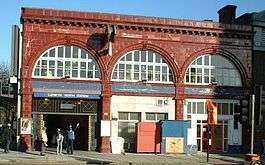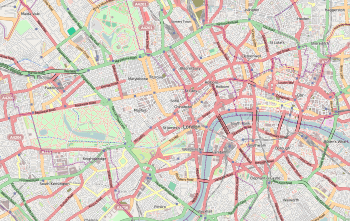Lambeth North tube station
| Lambeth North | |
|---|---|
 | |
 Lambeth North Location of Lambeth North in Central London | |
| Location | Lambeth |
| Local authority | Lambeth |
| Managed by | London Underground |
| Number of platforms | 2 |
| Fare zone | 1 |
| London Underground annual entry and exit | |
| 2013 |
|
| 2014 |
|
| 2015 |
|
| 2016 |
|
| 2017 |
|
| Railway companies | |
| Original company | Baker Street and Waterloo Railway |
| Key dates | |
| 10 March 1906 | Opened as Kennington Road |
| 5 August 1906 | Renamed Westminster Bridge Road |
| 15 April 1917 | Renamed Lambeth (North) |
| c. 1928 | Renamed Lambeth North |
| Other information | |
| Lists of stations | |
| External links | |
| WGS84 | 51°29′56″N 0°06′42″W / 51.499°N 0.1118°WCoordinates: 51°29′56″N 0°06′42″W / 51.499°N 0.1118°W |
|
| |
Lambeth North is a London Underground station in the neighbourhood of Lambeth, at the junction of Westminster Bridge Road and Baylis Road. It is on the Bakerloo line, between Elephant & Castle and Waterloo, and is in Travelcard Zone 1. It is located at 110 Westminster Bridge Road, and is the nearest tube station to the Imperial War Museum. It closed for maintenance works in July 2016,[2][3] and reopened in February 2017.[4] As of 2015 it is the least-used Underground station in Zone 1.
History
Designed by Leslie Green, the station was opened by the Baker Street & Waterloo Railway on 10 March 1906, with the name Kennington Road. It served as the temporary southern terminus of the line until 5 August 1906, when Elephant & Castle station was opened. The station's name was changed to Westminster Bridge Road in July 1906 and it was again renamed, to Lambeth North, in April 1917.
At 03:56 on 16 January 1941, a German "Satan" 1800 kg general-purpose bomb hit a hostel at nearby 92 Westminster Bridge Road. The shock wave severely damaged the southbound platform tunnel injuring 28 people sheltering there, one of whom died in hospital 15 days later. Thirty-seven rings of the damaged tunnel had to be completely replaced, 15 partially replaced, and 86 feet of platform rebuilt. Traffic through the station resumed after 95 days.
Layout
There are two tracks in separate tunnels. The station has two lifts and a spiral staircase connecting the street level to platform level (about 70 feet below). Immediately north of the station is a crossover enabling trains to terminate at both platforms. This is necessary for trains that are stabled at the London Road Depot, which can be seen on St George's Street and connects with the Bakerloo line north of the station.
Services
The typical service pattern in trains per hour (tph) is:[5]
- 6tph to Harrow & Wealdstone via Queens Park & Stonebridge Park (Northbound)
- 3tph to Stonebridge Park via Queens Park (Northbound)
- 5tph to Queens Park (Northbound)
- 14tph to Elephant and Castle (Southbound)
Connections
London Buses routes 12, 53, 59, 148, 159, 453 and C10 and night route N109 serve the station.
References
- 1 2 3 4 5 "Multi-year station entry-and-exit figures" (XLSX). London Underground station passenger usage data. Transport for London. January 2018. Retrieved 22 July 2018.
- ↑ "Station Closures Look ahead" (PDF). Transport for London. 10 July 2017. Retrieved 14 July 2017.
- ↑ "Lambeth North Underground Station (Zone 1)". Tfl.gov.uk. Transport for London. Retrieved 14 July 2017.
- ↑ "Lambeth North tube station reopens after lift replacement works". London SE1. 13 February 2017. Retrieved 14 July 2017.
- ↑ "Bakerloo Line Working Timetable No. 40" (PDF). Transport for London. 17 May 2015. Archived from the original (PDF) on 9 January 2016. Retrieved 18 August 2016.
External links
| Wikimedia Commons has media related to Lambeth North tube station. |
| Preceding station | Following station | |||
|---|---|---|---|---|
towards Harrow & Wealdstone | Bakerloo line | Terminus |